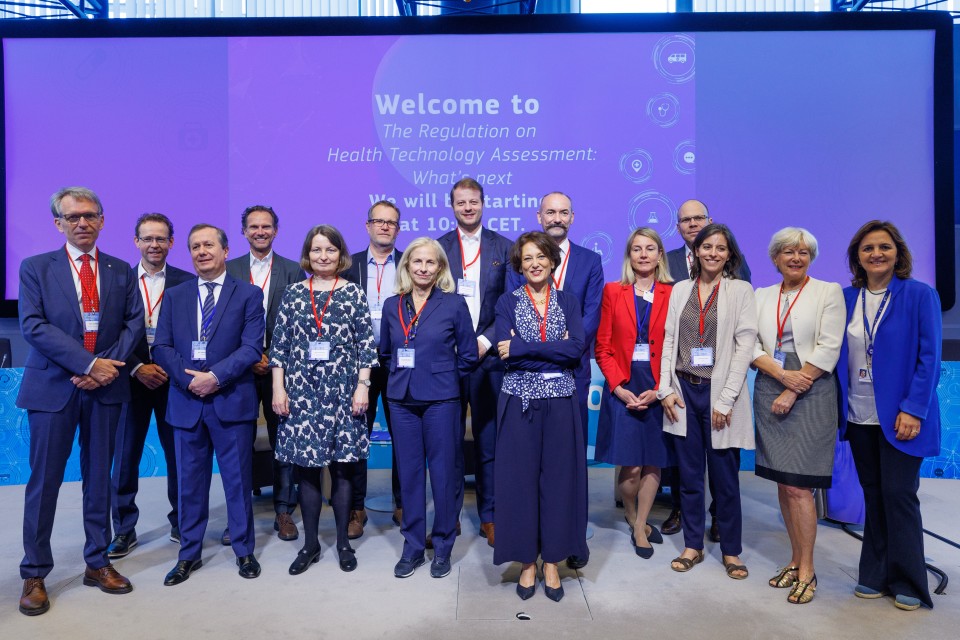EHA to the European Commission and HTA leaders: work with medical societies to involve experts and make joint assessments a success

The speakers of the HTA conference hosted by the European Commission. Photo credit: European Commission
Health Technology Assessment (HTA) plays an important role in determining the added value of new diagnostics, treatments, procedures and devices (‘health technologies’), both from a clinical and a cost-benefit point of view. The EU HTA Regulation (HTAR), which will become applicable as of January 2025, foresees in a harmonized legal and methodological framework for joint horizon scanning, joint scientific consultations and joint clinical assessments by Europe’s HTA bodies.
EHA has been a leading voice in support of joint European HTA, which can contribute to improving access to innovative therapies for patients across Europe by improving efficiency, reducing duplication, and ensuring the quality of clinical effectiveness evaluations. Cost-benefit assessments and decision making on pricing and reimbursement will remain national (Member State) competencies, but by providing a common information basis, the outcomes of the joint clinical assessments will contribute to more harmonized decisions and allocation of scarce public health budgets to technologies that are of real added value for clinical practice and patients.
EHA accepted invitations to speak at two recent meetings where leaders from the HTA community convened to discuss implementation of the HTAR. The HTA conference hosted by the European Commission (June 22, Brussels) focused on the development of methodologies and the involvement of clinical experts and patients. Speakers included EU Health Commissioner Stella Kyriakides, the European Commission’s head of HTA Flora Giorgio, the director of the EUnetHTA21 consortium leading HTAR preparations, and the presidents of the HTA bodies in Portugal and France, which have played key roles in advancing the EU framework for joint HTA amid hesitations among some Member States.
In the session dedicated to the role of patients and clinical experts in the HTAR framework, the medical societies’ perspective was presented by EHA (head of European Affairs Robin Doeswijk) and the European Society of Cardiology (Piotr Szymanski, chair ESC Regulatory Affairs Committee), which together lead the BioMed Alliance on HTA. Speaking alongside patient advocate François Houÿez (EURORDIS) and HTA leaders from France (Chantal Bélorgey, HAS) and Germany (Alric Rüther, IQWiG), they stressed the importance of:
- involving the best available experts (academia/healthcare professionals) to ensure top-quality clinical assessments,
- expert selection based on clear and transparent criteria, with a key role for Europe’s medical societies,
- pragmatic application of COI policies (allowing for participation, not exclusion, of top-tier experts/KOLs),
- striking a balance between the need for speed and quality in setting assessment timelines (often a challenge for KOLs who treat patients, teach students, lead research groups and volunteer for associations),
- improved and aligned data collection and sharing across development, market authorization and HTA processes to optimize clinical, regulatory and P+R decision making,
- timely and structural involvement of medical societies, to identify and help engage the leading experts but also to educate and train clinicians and for help in reaching out to patient organizations.
The key role of medical societies and the need to address practical obstacles to the involvement of top experts (COI, timelines, data generation) were again emphasized by EHA at the HTAi congress (June 27, Utrecht), the largest annual HTA meeting globally. Here, Robin Doeswijk joined a panel moderated by Zoey Garrett (NICE) and including Flora Giorgio (European Commission), Rui Ivo Santos (Infarmed), Alric Rüther (IQWiG) and Anne Willemsen (EUnetHTA21).



 Back
Back